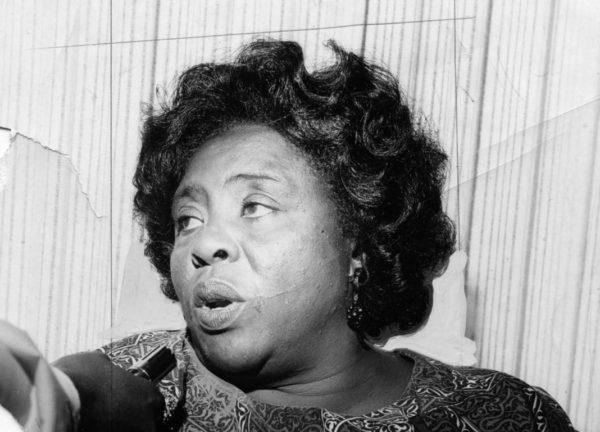
(Photo by Afro American Newspapers/Gado/Getty Images)
Fannie Lou Hamer (1917-1977)
- The Mississippi sharecropper’s forced sterilization was one of the moments that launched her to become part of the state’s civil rights movement.
- On the way back from a failed 1962 mission to register to vote in the county seat in Indianola, Miss., the bus of Hamer and 17 neighbors was stopped and the driver was arrested. Hamer burst into the negro spirituals “This Little Light of Mine” and “Go Tell It on the Mountain,” which became a star feature of her activism.
- When plantation owner W.D. Marlow demanded that she withdraw her voting application, Hamer refused saying, “I didn’t go down there to register for you. I went down to register for myself.” That quote would be one of her refrains throughout the movement.
- After discovering her penchant for song and battling voting rights, Hamer was recruited by SNCC as a community organizer following a successful conference at Nashville’s Fisk University.
- Yet Hamer’s refusal to withdraw her voting application meant her husband and adopted daughters were kicked off the plantation and Marlow took their possessions. The family’s sole source of income was Hamer’s $10 weekly SNCC stipend.
- In 1963, Hamer was one of several activists who sat at a white-only lunch counter in protest on a return from a citizenship training program in South Carolina. They were removed and jailed where they were beaten by cops and inmates. The resulting damage to Hamer’s eyes legs and kidneys would affect her until her death.
- Hamer ran for Congress the next year as the Mississippi Freedom Democratic Party candidate and challenged veteran Congressman Jamie Whitten in the Democratic primary, who won. Yet Hamer’s participation set an example by challenging the established Mississippi congressional delegation. It also led the MFDP to rise to national prominence.
- Journalist and volunteer Tracy Sugarman remarked on Hamer’s impact as she traveled to Oxford, Ohio to train volunteers to register voters. “Her mounting, rolling battery of quotations and allusions from the Old and New Testaments stunned the audience with its thunder.”
- Hamer died in 1977 of heart disease and cancer complications. Leaders like Pan-Africanist Stokely Carmichael praised her during her funeral.
- In 2012, a statue was unveiled in her honor, following a stamp that did the same for her and civil rights activist Medgar Evers in 2009.


